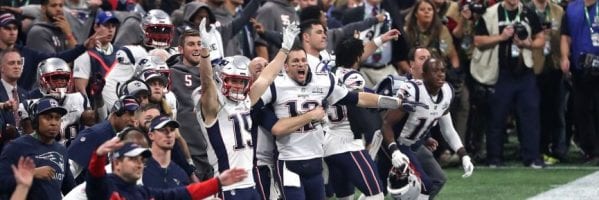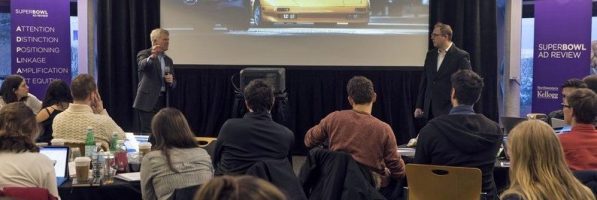Kellogg MBA Students Choose Best 2019 Super Bowl Ads

Aside from Tom Brady, Aaron Donald, and a shirtless Adam Levine, there’s no doubt that the Super Bowl commercials were the star of the night last Sunday.
The game, certainly, wasn’t the most thrilling. So the question is, what was the best ad of the 2019 Super Bowl? To get to the bottom of the question, a panel of Northwestern Kellogg MBA students got together to discuss each commercial. In the end, they looked for the ads that were the most and least effective at driving business and building their brands.
How Super Bowl Commercials Evaluation Works
First, before we dive into the best and worst ads, it’s important to know how the Kellogg MBAs made their evaluation. Working alongside two of the school’s most widely respected marketing professors—Time Calkins and Derek Rucker—the MBA panel applied the strategic ADPLAN framework.
A—Attention: Did the commercial engage the audience?
D—Distinction: Was the execution unique in delivery?
P—Positioning: Did the commercial represent the appropriate category and feature a strong benefit?
L—Linkage: Will the benefit and brand be remembered?
A—Amplification: Were viewers’ thoughts favorable?
N—Net Equity: Was the commercial consistent with the brand’s reputation and history?
From here, the MBA students came up with the final 2019 rankings.
Microsoft Super Bowl Commercial Wins
For the most effective ad, Microsoft took home the top prize. Their commercial spot was not only charming, but it stood out for its emotional tone and lack of clutter. The ad demonstrated Microsoft’s new adaptive controller and how it helps disabled kids play video games and form friendships. A clear benefit was apparent, showing how Microsoft technology makes the world a better place.
Amazon, Expensify, and Other Standouts
Other stand out advertisers for the Super Bowl included Amazon, Expensify, Washington Post, Pepsi, Bumble, and Google.
Bizarre Andy Warhol Burger King Commercial Flops
As for the least effective Super Bowl commercial, that honor went to Burger King. Their strange ad featured 1982 footage of Andy Warhol eating a Whopper, but it just came across as dull and uninteresting. Other advertising failures included the confusing Avocados From Mexico ad, Sprint’s flying horse disaster, the Turkish Airlines dark and scary spot, Mint Mobile’s unappealing chunky milk, and Simplesafe’s unbalanced ad. As for why each of these commercials failed, it always came back to a confusing message that didn’t deliver a clear benefit.
This article has been republished and edited from its original source, Clear Admit.
Amazon, Philly Win Super Bowl According to Northwestern Kellogg

Philadelphia football fans took to the streets, toppling cars, scaling street lamps, and setting at least one fire to celebrate their beloved Eagles’ first-ever Super Bowl win, 41 to 33 against the New England Patriots. But according to MBA students at Northwestern’s Kellogg School of Management, e-commerce giant Amazon was the victor in terms of best ads of the night.
On Sunday, as the game got underway in minus-2-degree Fahrenheit Minneapolis, approximately 50 Kellogg students teamed up with marketing professors Tim Calkins and Derek Rucker to determine the night’s winners and losers in the battle of the brands. Advertisers spend more than $2 billion each year and roll out highly anticipated Super Bowl commercial spots in an effort to imprint their brands in the minds of millions of spectators—some wowing and others bombing in the process.

Kellogg students watch commercials during the Super Bowl at the Allen Center Atrium in Evanston, Illinois, February 4, 2018. Photo by Jim Young for Kellogg
Armchair spectators around the world pick their own winners and losers among the ads, but for the 14th year running, Kellogg students applied a unique framework for evaluating an ad’s brand-building potential as part of last night’s 2018 Kellogg School Super Bowl Ad Review. Using the ADPLAN framework to evaluate each ad according to six critical criteria—Attention, Distinction, Positioning, Linkage, Amplifications and Net Equity—the Kellogg students determined the winner of the night to be Amazon with its “Alexa Loses Her Voice” commercial spot. Also scoring highly were Mountain Dew, Doritos, Tide, Avocados from Mexico, and Wendy’s.
Joining the Pats in defeat, according to the Kellogg review, were Squarespace and T-Mobile, which each received “F” grades for least effective advertising during the game.
“Amazon used a cast of celebrities that focused us on the brand, reinforced the equity in Alexa, and ultimately was fun to discuss and share with those around you,” Professor Rucker said in a statement. The Amazon ad included appearances by Cardi B, Rebel Wilson, and Amazon CEO Jeff Bezos. “However, Squarespace and T-Mobile both missed the mark with questionable positioning and unclear calls to action,” continued Rucker.

Kellogg students analyzing Super Bowl ads in real time. Photo by Jim Young for Kellogg
Professor Calkins called attention to two trends that emerged across the big game’s ads—a competitive angle and philanthropy. “As competitive as the game was, the category wars were equally competitive,” Calkins said in a statement. “For example, there was hard hitting competition in the wireless wars with some brands calling one another out,” he noted. In addition to poorly performing T-Mobile, wireless advertisers included Sprint and Verizon, which the Kellogg student review team each awarded “B” grades.
“Many brands tried to appeal to viewers through philanthropic causes, including Toyota, Ram, and Hyundai,” Calkins added. Ram, for its part, sought to sell its trucks using images of people helping others with a sermon given by Dr. Martin Luther King, Jr. as the voice over. The ad concluded with the phrase “Built to Serve” flashed on the screen alongside a Ram logo. Unfortunately for Ram, the social media backlash was fast and furious.
“A Martin Luther King Jr speech to sell @Dodge Ram trucks? Totally offensive #mlk,” wrote one user on Twitter.
Several other tweets expressed similar sentiments:
There was audible painful groaning at the Super Bowl party I’m at as everyone realized Dodge Ram was trying to profit off of an MLK speech
— Hunter Walker (@hunterw) February 5, 2018
Not sure MLK’s dream was to drive a Dodge Ram.
— ItsTheReal (@itsthereal) February 5, 2018
“I have been to the mountaintop. And I got there in a Ram truck.” – MLK
— SportsPickle (@sportspickle) February 5, 2018
The Kellogg student team gave the Ram commercial a “C” grade overall, but Calkins had more to say in an interview with the New York Times. “It’s the wrong mistake to make given everything that’s going on in the U.S. right now,” he told the Times. “There’s so much emotion right now around race in this country that this was a high-risk move, and clearly it’s not going over very well,” he continued.
“I think it was well intentioned, but they’re going to have a lot of explaining to do,” Calkins continued. “They did not release this ahead of time, so they went for the surprise. They got that, but at the same time they now have a big problem with feedback and people being upset.”
Though many on Twitter directed their ire toward Dodge—the Detroit-based car manufacturer founded by two brothers of that name in the early 1900s—the Ram Truck brand was officially separated from the Dodge car brand in 2009 as part of an acquisition by Italian automaker Fiat S.p.A. Its successor, Fiat Chrysler Automobiles, is the current owner of the Ram Tuck brand.
Perhaps some of the confusion around brand will be a boon to Ram’s owner as it attempts to recover from its Super Bowl fumble. As for whether ad champion Amazon will look favorably on football champion Philadelphia as a spot for its future HQ2—another topic of speculation on social media last night—only time will tell. What we do know is that the students at Kellogg will carry lessons learned from advertising’s biggest night along with them into their future careers in marketing.
For the full 2018 Kellogg School Super Bowl Ad Review results, click here.
To learn more about the Kellogg School Super Bowl Advertising Review, click here.
